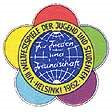This article has multiple issues. Please help improve it or discuss these issues on the talk page . (Learn how and when to remove these messages)
|
| 8th World Festival of Youth and Students | |
|---|---|
 | |
| Host country | |
| Dates | July 28 – August 6, 1962 |
| Motto | For Peace and Friendship |
| Cities | Helsinki |
| Participants | 18,000 people from 137 countries |
| Follows | 9th World Festival of Youth and Students |
| Precedes | 7th World Festival of Youth and Students |
The 8th World Festival of Youth and Students (WFYS) was held in 1962 in Helsinki, capital city of Finland.
Contents
The World Federation of Democratic Youth organized this festival together with the International Union of Students. [1] Finland was the second country, after Austria, to host the event despite being a non-aligned state. [2] The festival ended up costing 247 million markka (4.9 million 2013 euros).[ citation needed ] It was also reported that Moscow spent $25 million on the festival. [3]
Over 1,000 events were planned as part of the festival, and its attendants were provided with free dining and housing in Helsinki. About 18,000 people from 137 countries attended. [4] It was the largest event organised in Helsinki since the 1952 Summer Olympics. According to local newspapers, there were at least 40,000 people present at the finishing event of the festival. [1] Soviet cosmonaut Yuri Gagarin notably attended the festival. [5]
For many young Finns, the festival was the first opportunity to meet young people from socialist countries and developing countries outside of Europe.
The motto of the festival was For Peace and Friendship.